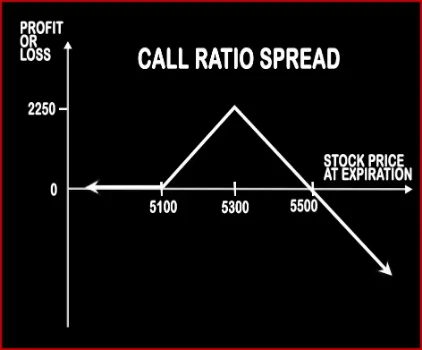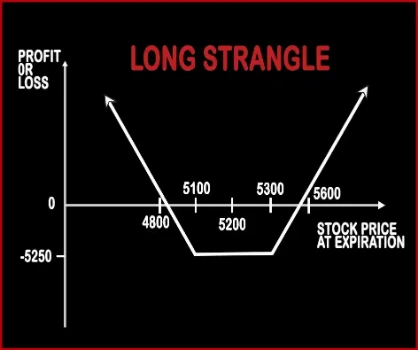Compare Strategies
| RATIO CALL SPREAD | LONG STRANGLE | |
|---|---|---|

|

|
|
| About Strategy |
Ratio Call Spread Option StrategyAs the name suggests, a ratio of 2:1 is followed i.e. buy 1 ITM Call and simultaneously sell OTM Calls double the number of ITM Calls (In this case 2). This strategy is used by trader who is neutral on the market and bearish on the volatility in the near future. Here profits will be capped up to the premium amount and risk will be potentially unlimited since he is |
Long Strangle Option StrategyA Strangle is similar to Straddle. In Strangle, a trader will purchase one OTM Call Option and one OTM Put Option, of the same expiry date and the same underlying asset. This strategy will reduce the entry cost for trader and it is also cheaper than straddle. A trader will make profits, if the market moves sharply in either direction and gives extra-ordinary returns in the .. |
RATIO CALL SPREAD Vs LONG STRANGLE - Details
| RATIO CALL SPREAD | LONG STRANGLE | |
|---|---|---|
| Market View | Neutral | Neutral |
| Type (CE/PE) | CE (Call Option) | CE (Call Option) + PE (Put Option) |
| Number Of Positions | 3 | 2 |
| Strategy Level | Beginners | Beginners |
| Reward Profile | Limited | Unlimited |
| Risk Profile | Unlimited | Limited |
| Breakeven Point | Upper Breakeven Point = Strike Price of Short Calls + (Points of Maximum Profit / Number of Uncovered Calls), Lower Breakeven Point = Strike Price of Long Call +/- Net Premium Paid or Received | Lower Breakeven Point = Strike Price of Put - Net Premium, Upper Breakeven Point = Strike Price of Call + Net Premium |
RATIO CALL SPREAD Vs LONG STRANGLE - When & How to use ?
| RATIO CALL SPREAD | LONG STRANGLE | |
|---|---|---|
| Market View | Neutral | Neutral |
| When to use? | This strategy is used by trader who is neutral on the market and bearish on the volatility in the near future. Here profits will be capped up to the premium amount and risk will be potentially unlimited since he is selling two calls. | This strategy is used in special scenarios where you foresee a lot of volatility in the market due to election results, budget, policy change, annual result announcements etc. |
| Action | Buy 1 ITM Call, Sell 2 OTM Calls | Buy OTM Call Option, Buy OTM Put Option |
| Breakeven Point | Upper Breakeven Point = Strike Price of Short Calls + (Points of Maximum Profit / Number of Uncovered Calls), Lower Breakeven Point = Strike Price of Long Call +/- Net Premium Paid or Received | Lower Breakeven Point = Strike Price of Put - Net Premium, Upper Breakeven Point = Strike Price of Call + Net Premium |
RATIO CALL SPREAD Vs LONG STRANGLE - Risk & Reward
| RATIO CALL SPREAD | LONG STRANGLE | |
|---|---|---|
| Maximum Profit Scenario | Strike Price of Short Call - Strike Price of Long Call + Net Premium Received - Commissions Paid | Profit = Price of Underlying - Strike Price of Long Call - Net Premium Paid |
| Maximum Loss Scenario | Price of Underlying - Strike Price of Short Calls - Max Profit + Commissions Paid | Max Loss = Net Premium Paid |
| Risk | Unlimited | Limited |
| Reward | Limited | Unlimited |
RATIO CALL SPREAD Vs LONG STRANGLE - Strategy Pros & Cons
| RATIO CALL SPREAD | LONG STRANGLE | |
|---|---|---|
| Similar Strategies | Variable Ratio Write | Long Straddle, Short Strangle |
| Disadvantage | • Unlimited potential loss. • Complex strategy with limited profit. | • Require significant price movement to book profit. • Traders can lose more money if the underlying asset stayed stagnant. |
| Advantages | • Downside risk is almost zero. • Investors can book profit from share prices moving within given limits. • Trader can maximise profit when the share closes at the upper breakeven point. | • Able to book profit, no matter if the underlying asset goes in either direction. • Limited loss to the debit paid. • If the underlying asset continues to move in one direction then you can book Unlimited profit . |